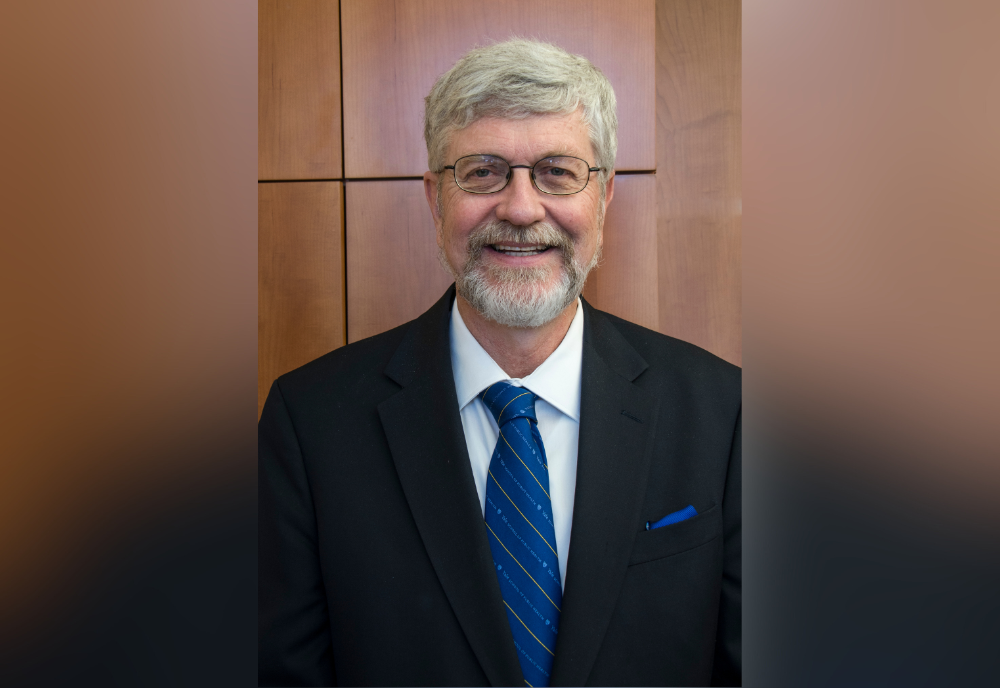As Dr. Sten Vermund, MD, PhD, takes over this month as the new dean of USF’s College of Public Health (COPH), he brings more than deep experience in infectious disease epidemiology and prevention. The whirlwind of global change in disease, climate, technology, politics and economies is reshaping the future of health and exposing new challenges that he believes should be confronted head on.
Vermund comes to Tampa from New Haven, Conn., where he served as dean of the Yale School of Public Health and professor in pediatrics and clinical professor in obstetrics, gynecology and reproductive sciences at the Yale School of Medicine.
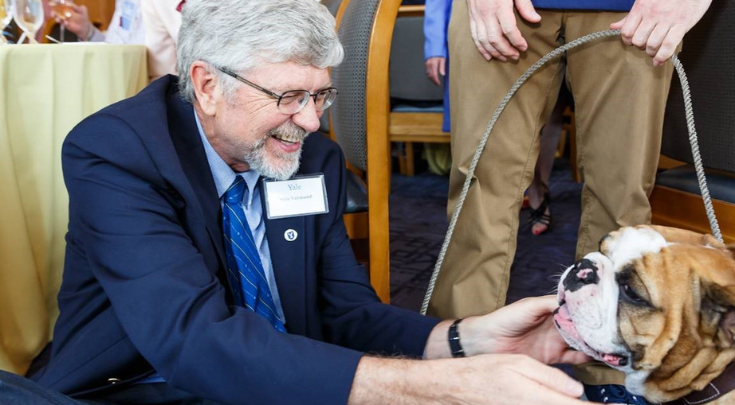
Dean Vermund enjoyed a meet and greet with Yale's mascot, a bulldog traditionally named Handsome Dan. (Photo courtesy of Vermund)
Prior to his work at Yale, Vermund was vice president for global health at Vanderbilt University Medical Center. In addition to his career in academics, he was chief of the epidemiology branch for the National Institutes of Health/National Institute of Allergy and Infectious Diseases/Division of AIDS from 1988 to 1994.
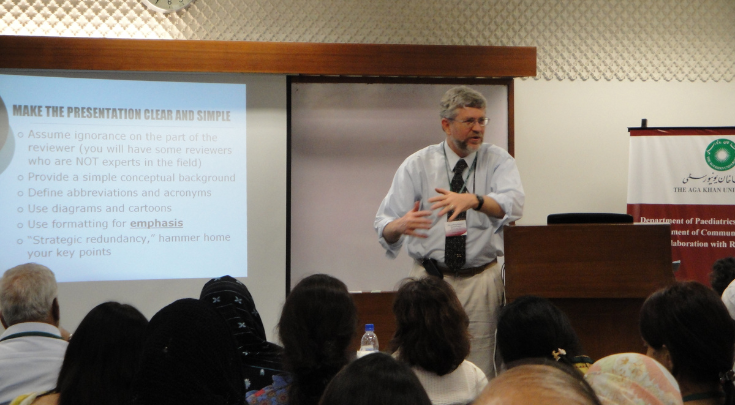
Dean Vermund has been helping in Pakistan with Fogerty International Center a NIH training grant for Maternal and Child Health for a number of years. (Photo courtesy of Vermund)
In his new position as dean, Distinguished University Health Professor, senior associate vice president of USF Health, he will oversee the COPH’s 4,700 students and more than 400 faculty and support staff. He succeeds Dr. Donna Petersen, who served at USF for two decades.
We caught up with Vermund and asked about his new role, the impact of COPH and what he sees as obstacles to public health policy.
What inspired you to take on this new position?
“The energy and ambition of the institution, its leadership and the extraordinary faculty augured well for my new professional and life adventure. Also, the chemistry seemed just right in all of my meetings and consultations at USF.’’
What do you see as the role of COPH in our community and in preparing young professionals for careers in public health? How will you help shape that vision?
“The COPH has its obligation to Florida, our nation and the world. Challenges facing all three are similar:
- The use of big data, artificial intelligence and machine learning to understand and predict
- Health economics to guide our policymakers
- Emerging challenges from more extreme weather and heat
- Emerging issues for successful pregnancy, healthy childhood, lifestyle-linked diseases and healthy aging
- Under- and over-nutrition
- Reducing cancer and heart disease
- Preparing for and preventing the next pandemic
I hope to help the COPH community assess what is more important for us and what plays to our strengths, balancing them to grow our curriculum and research.’’
Do you feel you are working with a remarkable talent base at COPH?
“The excellence of our faculty is something to build upon as we strengthen our ability to prepare the public health workforce of the future. We are good at some things and not so good at others. This is also true for other medium or small-sized schools of public health. Building on strengths and addressing weaknesses is the duty of leadership.’’
What do you envision from these students when they graduate and move into professional careers?
“We expect our students to apply their knowledge in partnership with communities to achieve the best possible health outcomes, applying lifelong learning skills to keep abreast of the science that guides them.’’
Are enough people going into the field to satisfy the demands put on our health system?
“COVID-19 and government cost cuts lowered the absolute size of the public health workforce in the United States. However, there has been a surge in schools and programs in public health that are helping meet private and public sector demand.’’
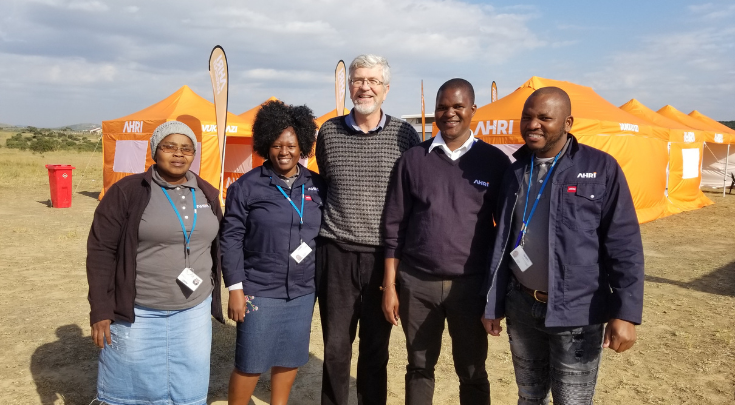
While visiting the field site for the African HIV Research Institute, Vermund learned how to help HIV infected people learn their status in order to access HIV care. (Photo courtesy of Vermund)
Your expertise is infectious disease as well as pediatrics. Is there a connection between these two disciplines? How did they meet in your professional life?
“Clinical pediatrics is heavily influenced by the infections that children acquire, so linking pediatric practice with infectious disease prevention and control as a natural evolution for me. Besides, as a young pediatrician, I got every conceivable diarrheal and respiratory disease (occupational hazard of pediatrics), so I figured I'd be immune from most future risks!’’
Should the United States be prepared for another, more serious COVID outbreak, or do you feel we are better prepared than a few years ago?
“There are many respiratory viruses with pandemic potential, notably influenza viruses and coronaviruses. We are still not taking pandemic preparedness as seriously as we should, surprising given the trillions of dollars of cost to our economy and over a million deaths in the United States for COVID-19. Yes, we are better prepared. No, we are not adequately prepared.’’
We read more and more about bird flu and the possibility of cross-species transmission. What is the concern for people and should the public be better prepared for these outbreaks?
“Bird flu is ubiquitous in the animal kingdom. Since 2003, we have had 1,000 avian influenza cases in humans, half of which were fatal. In the current outbreak, we've had over 65 cases through December 24, most in poultry, dairy and cattle workers. I believe that all persons at substantial risk, as with animal-focuses occupational groups, should be vaccinated against both the seasonal flu and the H5N1 flu. As for the rest of us, we will do very well to be fully up-to-date with our annual flu shots to maximize protection against those viruses that we are likely to see this winter.’’
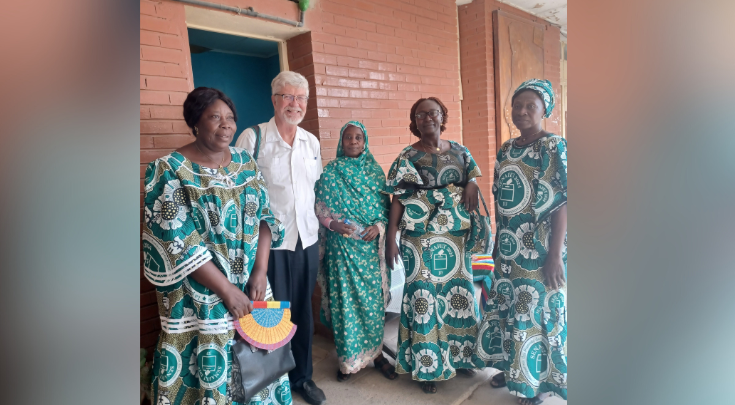
Dean Vermund visited Chad on national women's day at the national hospital. (Photo courtesy of Vermund)
Many scientists believe global warming could change the dynamic of diseases, as vectors migrate to warmer (or cooler) climates. Is this a legitimate concern?
“Insect vectors thrive in warmer, moister environments, so the increasing global temperatures are favorable for expanding vector capacity, as with mosquitoes and ticks. A few environments may become less friendly, as in desert border areas where temperatures rise so high as to reduce the capacity of vectors to live and breed. But these areas are not well populated at present, so the rest of us are in trouble. The gulf coast states and territories like Puerto Rico are especially vulnerable.’’
Many people are concerned about the direction of the federal Centers for Disease Control and even state health organizations under the new president. How can people better educate and prepare themselves for these political shifts in health policy?
“Public health has always been political. If a public works system needs repair to guarantee clean drinking water, this costs money and elected representatives will vote for or against the money needed. However, public health has not historically been very partisan, with Republicans and Democrats alike using their judgement as to the costs and benefits. However, we now have unprecedented partisan divides in public health policy, perhaps symbolized by the reaction to vaccinations. I believe that we must all seek our information from informed sources and not persons who claim expertise but have none.’’
Speaking of public health, there seems to be a lot of ‘disinformation’ about everything from fluoride in drinking water to the efficacy of vaccinations. What are your thoughts?
“This is a major challenge for COPH. How can we communicate more effectively the evidence for or against public health measures, based on effectiveness, cost and safety? The ability to communicate to the people of Florida and their political leaders has become a critical element of public health training.’’
Briefly, what lessons and experiences are you bringing to USF from your time at Yale?
“Community engagement, clarity of messaging and partnerships across all the colleges at USF will serve us well. We do well thinking outward, how to extend our disciplines to broader alliances.’’
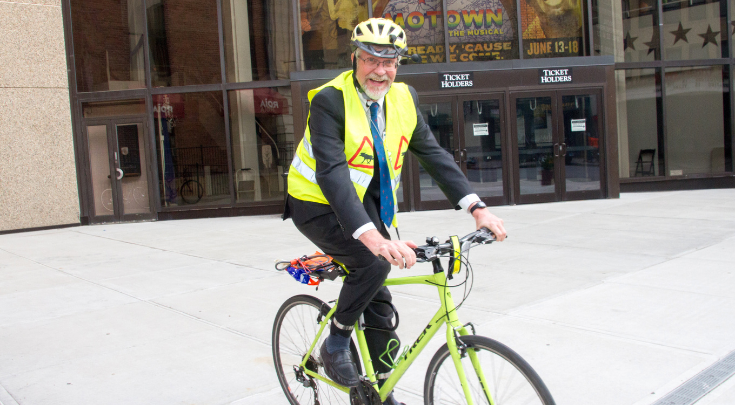
Dean Vermund pedals toward a greener future, leading by example in both public health and sustainability. (Photo courtesy of Vermund)
The two recent hurricanes have caused extensive destruction in our area, and even taxing health care and public workers. How do you view natural disasters affecting society’s approach to health care in the future?
“Thousand-year or hundred-year events may now be fifty-year and twenty-year events, respectively, given more extreme weather fueled by warming air and sea temperatures and higher atmospheric water vapor levels. Preventive measures are needed to blunt the impact on humans and on property and farms. In public health, this means we must prepare for effective emergency responses and to target help to especially vulnerable persons in at-risk housing.’’
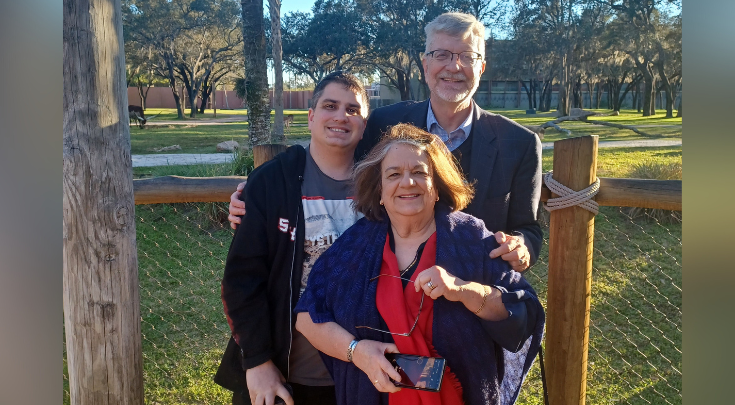
Gabriel (left), based out of Orlando, Fla., is a customer service representative at Disney, and is the adult son of dean Vermund and his wife Pilar Vargas, MD, PhD (front). (Photo courtesy of Vermund)
You are married to a doctor (Pilar Vargas, MD, PhD). What is the family dynamic like? Do you often agree or disagree over scientific subjects?
“We are more likely to debate whether my tie goes with my shirt than whether licensed vaccines protect children.’’
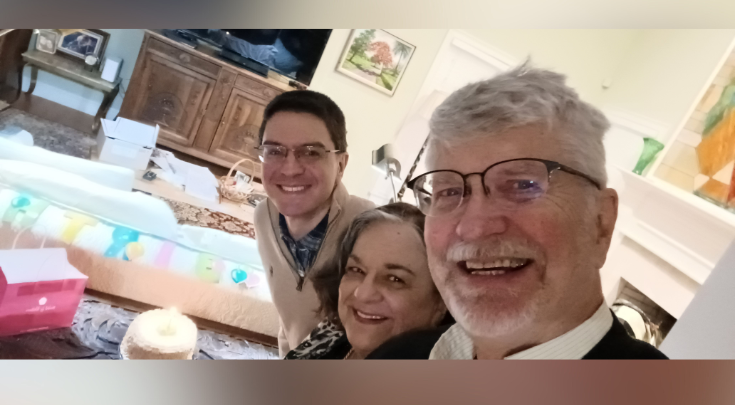
Dean Vermund and wife Pilar Vargas, MD, PhD are pictured with their oldest son Julian (left), who lives in New Haven, CT and works as an optometrist. (Photo courtesy of Vermund)
You lived in the New Haven, which boasts of the country’s best pizza. Is it true?
“We’re as proud of our New Haven pizza as Tampa is of its Cuban sandwich.’’
